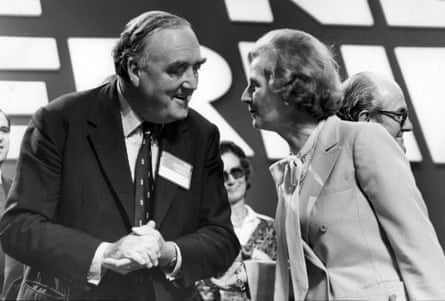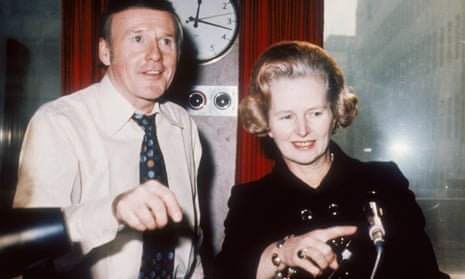These days, BBC crises reflect the corporation’s unique status as a kicked-around, intermittently revered piece of national furniture. The message of Jean Seaton’s tart, idiomatically written, brilliantly comprehensive history of the BBC in its prime is that this wasn’t always so. During the 1970s, and throughout the Thatcher years, the BBC existed in a state of more or less permanent crisis. It was starved of funds by a bruised, antagonistic Labour government, which considered abolishing the licence. Then, in the 1980s, it became the target of numerous handbaggings from Mrs T. Although the book’s title comes from a Private Eye Dear Bill column, it is clear that (though Thatcher didn’t watch much TV, except for Yes Minister, which she never missed) this was indeed what the prime minister thought of those who worked at the corporation.
Seaton succeeds the venerable Lord Briggs in the role of BBC official historian, and she writes as an admirer of the BBC and what it stands for. She knows about journalism, and her best chapters ruthlessly investigate the BBC’s “hard impartiality”. It wasn’t easy to stand back from the history of Northern Ireland, reporting atrocities as they were viewed by each of the warring communities, but the BBC did just that. At the same time, Seaton is swift to acknowledge what had gone wrong with the BBC by the late 1970s. As the current controller of Radio 4 explains, it was “bad at the big picture”. All-male Oxbridge BBC mandarins didn’t care why Thatcher had been elected because they failed to take her ideas seriously. They were also fighting their own obscure BBC turf battles. (It turns out that the BBC, in a stroke of bureaucratic ingenuity, had got MI5 to vet its staff, thus evading responsibility for any actions that might seem less than liberal.) When David Cornwell (John le Carré) was asked by executives how George Smiley’s office life should be depicted in the TV version of Tinker, Tailor, Soldier, Spy, he replied that they should look around them.

Under pressure to be patriotic, particularly during the Falklands war, the BBC buckled, but, happily, didn’t give ground. It was saved by a cabal of one-nation Tories, of whom home secretary Willie Whitelaw was the most adept. The economist Sam Brittan was astute enough to see, even at the high tide of Thatcherism, that the BBC could do things that the market couldn’t, and his views prevailed when it mattered most, during the Peacock inquiry set up by Thatcher to devise another method of corporation funding. But above all, the BBC was saved by its diligent, impassioned staff, who continued against the odds to make remarkable programmes throughout these years of crisis.
Much of the BBC’s daily output was humdrum, but it is astonishing to recall its many successes, from Dennis Potter’s inspirational The Singing Detective, through Arena’s quirky film essays to the now unjustly forgotten That’s Life, which introduced consumer journalism to the British public. Seaton believes that David Attenborough’s Life on Earth has never been surpassed. Far more than a nature series, it did indeed reflect the core BBC values of curiosity and passion for knowledge, and it took the British public out of themselves in a bad time, making them less frightened. She is also perceptive about the impact of reporting from Ethiopia in creating the Live Aid concerts. BBC mandarins (though not Thatcher) were uneasy about what they saw as an ill-advised corporation venture out of impartiality and into campaigning. Money didn’t always go to the right people, but the world would be different, and poorer, without Bob Geldof and his inspired use of the BBC.
Seaton has struggled through the minutes and done the interviews. She writes superbly about the struggles of women against ingrained sexism. (It comes as a surprise to learn that the chairman of the BBC would think of claiming for a prostitute on expenses.) The BBC isn’t an easy place to work, indeed it’s often a ruthless, punishing place, and Seaton has reclaimed the careers of many forgotten figures – those who did “the bad stories” in Belfast, ironic, supple mandarins such as Brian Wenham and impresarios such as Bill Cotton. The most tragic figure, truly representative of the old regime, was the ill-fated director general Alistair Milne. A brilliant programme-maker, stubborn and unbiddable, Milne was offloaded in an afternoon. For the BBC to survive, he had to go, and he did, loyally and quietly.
In the end, the BBC survived because enough people close to power wanted it to survive, and because people in large numbers wanted to watch its programmes. It is hard to imagine that there won’t be more crises, with sackings. But it’s also hard to imagine that the BBC will ever again seem to dominate the way the nation sees itself. This doesn’t mean that the BBC is less important – indeed, it may be more needed in a global environment characterised by erratic flows of globalised information. Seaton thinks that the BBC World Service, “smelling of pluralism”, as its former head John Tusa described it, was among the triumphs of the cold war. But the World Service is nowadays funded, not by the Foreign Office, but by domestic licence-fee payers; and this must be a future source of worry.
Meanwhile, Seaton’s book is the best argument I have read in favour of the BBC. It made me hope that she will write another volume, taking us near to the present. Will we continue to want the BBC “to confront us with truths” and entertain us? Do we want to pay for the BBC? If we say no, what would take its place? These are the questions we now need to ask.
Nick Fraser is editor of BBC Storyville. Pinkoes and Traitors is published by Profile for £30. Click here to buy it for £24

Comments (…)
Sign in or create your Guardian account to join the discussion